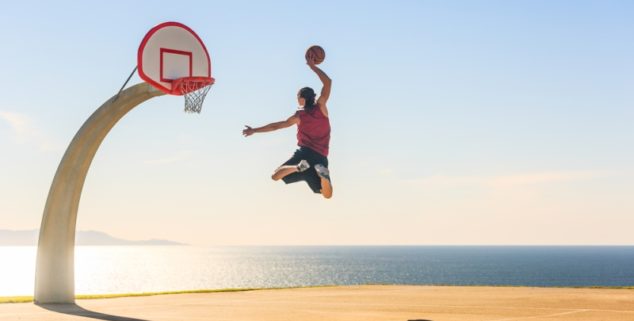News
A major push to allow pay for amateur athletes
 A basketball player takes to the air to score an amazing dunk. (Image: PKpix, via Shutterstock)
A basketball player takes to the air to score an amazing dunk. (Image: PKpix, via Shutterstock)Amateurism’s last stronghold in California, intercollegiate student athletics, may be coming to an end.
Up before lawmakers are two bills – SB 206 and AB 1518 – that tackle an age-old characterization of student athletes as amateurs. As amateurs, they cannot receive compensation beyond a scholarship or enlist the help of a sports agent. Both measures were easily approved in their houses of origin.
College athletics is big business in California, bringing in over $700 million per year, in revenue directly attributable to the efforts of college athletes. Some believe that estimate is conservative.
With the risk of losing a scholarship, accumulating debt, or simply facing a shortage of funds, many student athletes consider seeking outside compensation.
For athletes, there is limited return on the value they offer their colleges and universities. Many athletes are lured to schools through the promise of a free education — but even this comes with a catch.
According to group called Next College Student Athlete (NCSA), if an athlete is a part of the 2% of students who are offered a scholarship, only a handful will receive a full ride and fewer still will receive enough to prevent out-of-pocket expenses.
Student athletes who do receive a scholarship are often subjected to contracts on a yearly basis, according to NCSA. Injuries, poor grades, poor behavior, insufficient class load, and poor performance can all result in scholarships being revoked, the group noted.
With the risk of losing a scholarship, accumulating debt, or simply facing a shortage of funds, many student athletes consider seeking outside compensation.
Many Division 1 athletes in demanding sports won’t have time to hold a part-time job and are unable to make money off their talents by signing sponsorship deals with big corporations like Coke-Cola and Nike. If caught doing so, they are disciplined by organizations such as the National Collegiate Athletic Association (NCAA) and can be deemed ineligible to play and/or retain their scholarship.
The NCAA declined to comment for this story.
Agents can negotiate and help mitigate the tricky bylaws of contracts, but they are generally barred from doing so under NCAA rules.
While scholarships remain rare, sports agents say, the students who receive them get a lower cost education and the opportunity to perform at a high caliber for the love of the game.
Is that a sufficient trade off? Sen. Nancy Skinner, D-Berkeley, the author of SB 206, argues no.
The bill, easily approved 30-4 in the Senate, awaits action in the Assembly.
“For too long, college athletes have been exploited by a deeply unfair system,” Skinner said in a written statement. “Universities and the NCAA make huge amounts of money from TV deals and corporate sponsorships of their teams. Athletic talent has value, and college athletes deserve to share in that value. The Fair Pay to Play Act (SB-206) allows athletes to finally be compensated for their hard work —work that generates billions of dollars for their schools, corporate sponsors and media networks.”
Under her bill, athletes at California’s 24 public and private colleges and universities that currently participate in Division 1 sports will be eligible to be paid directly from a private or commercial source for their name, image, and likeness.
The bill would also make it illegal for any organization to restrict these rights to collegiate athletes or revoke a scholarship because of payment for name, likeness, or image.
USC, a critic of the legislation, said Skinner’s bill would “encourage students to violate the NCAA bylaws, becoming athletically ineligible
and putting athletic teams and athletic departments at risk. The NCAA has two bylaws that specifically prohibit participation in intercollegiate competition if they receive any outside compensation.”
A related measure, AB 1518 by San Jose Democratic Assemblymember Kansen Chu, deals with a student athlete’s inability to keep an agent on retainer. Chu’s bill is in the Senate, following a 74-0 vote in the 80-member Assembly.
If they don’t make the leap to professional status, AB1518 prevents athletes from jeopardizing their amateur status within the NCAA.
Agents can negotiate and help mitigate the tricky bylaws of contracts, but they are generally barred from doing so under NCAA rules.
Chu’s AB 1518 would update California law to reflect changes in the NCAA that allow student athletes to take on an agent while participating in a professional draft. In turn, it would allow the agent’s student athlete to be compensated if NCAA guidelines are met.
If they don’t make the leap to professional status, AB1518 prevents athletes from jeopardizing their amateur status within the NCAA as a student-athlete and allows them to return to their sport in good standing.
Backers of AB 1518 include the California State University, the University of Southern California and the Association of Independent California Colleges & Universities. According to an Assembly analysis, no opposition was noted.
Skinner’s bill, SB 206, was backed by a number of labor groups, including the Association of African Americans in Fire Service, the American Federation of Labor and the American Federation of State, County, and Municipal Employees. Others included the National College Players Association, which was a sponsor of the bill, and the University of California Student Association.
Opponents included CSU, Stanford University, the University of California and USC.
—
Editor’s Note: Corrects URL link in 5th graf.
Want to see more stories like this? Sign up for The Roundup, the free daily newsletter about California politics from the editors of Capitol Weekly. Stay up to date on the news you need to know.
Sign up below, then look for a confirmation email in your inbox.

Leave a Reply